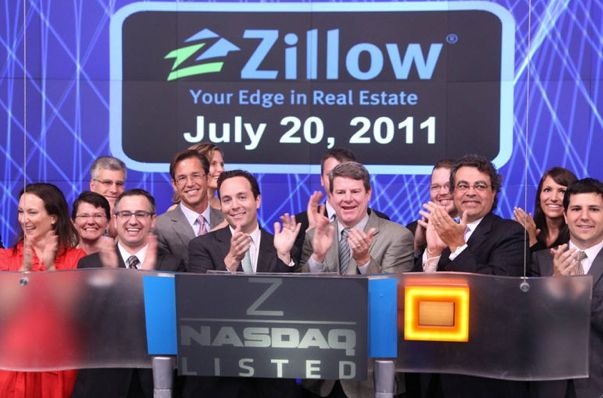
Zillow has been on a hot streak in recent weeks, and now the Seattle online real estate company has surpassed yet another milestone. The company’s stock has surged above $60 per share, valuing Zillow at a whopping $2.1 billion.
Some industry watchers thought the company was overvalued when it came public at $20 per share back in July 2011, and certainly should never be valued at upwards of $1 billion. Those naysayers now have some egg on their face.
Zillow, along with rival Trulia, which also is surging with a stock price that has doubled so far this year, are benefitting from the rebound in the housing market. Both companies got a boost on Wednesday when bombastic stock picker Jim Cramer gushed about their prospects, calling them the “picks and shovels” of the housing market.
“If you want growth, it is this area. It’s Trulia, it’s Zillow,” he said. “In this housing market—finding a house, valuing a house—there is room for more than even one.”
Just to put Zillow’s $2.1 billion valuation in perspective. It’s nearly 10 times the market cap of RealNetworks.

After a series of acquisitions in the past 18 months, Zillow now employs nearly 700 people. It attracted 50 million visitors in March.

Zillow is still perceived as an industry outsider, though the company has worked hard in the past five years to bolster its image with real estate professionals (who buy advertising on the site and purchase the company’s business tools).
At a talk on Seattle University’s campus Tuesday night, CEO Spencer Rascoff described that transformation, one which is helping the company pick up new customers and perform well on Wall Street.
“We were industry outsiders, and we still are in the sense that I’ve never been in real estate,” said Rascoff. “The industry outsider perspective has mostly served us well. It has been advantageous because it helps you look at things from a brand new place. The disadvantage is that we’ve definitely made mistakes along the way.”
Rascoff retold a story about how the company in its early stages accumulated real estate licenses in some states, part of a plan to better value homes through its Zestimates. Rascoff said it was never the intention to insert itself in the real estate transaction, but the real estate licenses caused some distrust in the industry.
In 2008 as part of a cost-cutting measure, Zillow slashed nearly all of the company’s real estate brokerage licenses.
“The industry breathed this huge sigh of relief. I got all of these emails and phone calls from these people in the industry who said: ‘Oh, now we believe you. Now, we trust that you are not trying to put real estate agents out … and lower commission. Now, we trust that you are not Redfin. Now, we trust that you don’t have us in your sights. You had all of these brokerage licenses for all of these years, though, and we’ve been worried.’ And I was like, I wish someone told me because I didn’t even really know that they were that controversial. We just got them as belt and suspenders because our lawyers told us too. If I had known there was all of this distrust for having these licenses, I would have never gotten them in the first place.”
Previously on GeekWire: Zillow CEO Spencer Rascoff’s secrets to startup success: Be a servant to your managers



